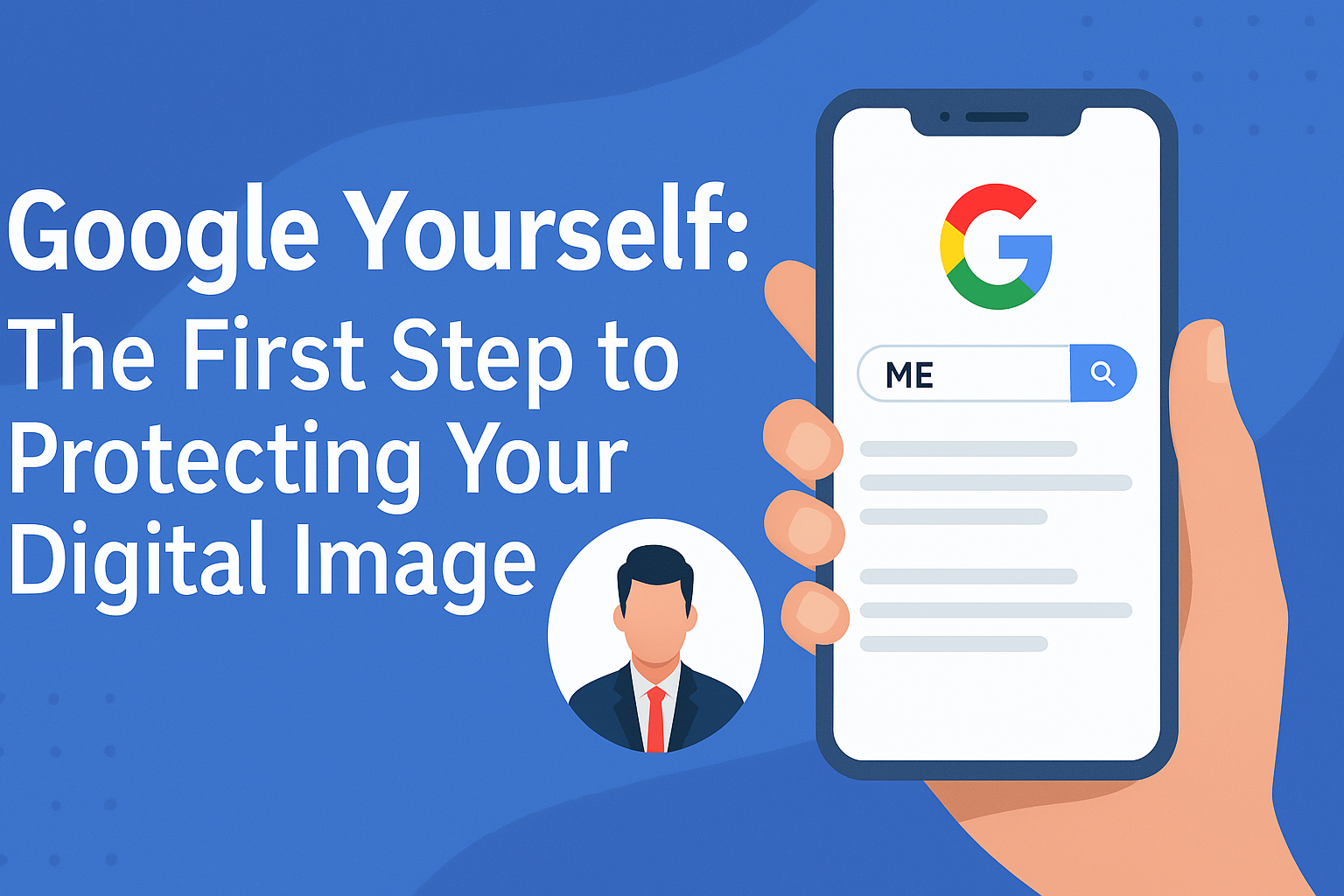Estimated reading time: 4 minutes
Table Of Content
Why You Should Google Yourself Today
Most people are surprised by what turns up when they search their own name. Whether you’re a job seeker, executive, entrepreneur, or freelancer, your online presence influences perception.
What Googling Yourself Can Reveal:
- Old news articles or public records
- Social media posts from years ago
- Negative reviews or complaints
- Content shared without your consent
- Duplicate identities or impersonators
Running regular self-searches is foundational to personal branding and essential to manage your digital image.
Understanding Online Identity: Your Digital Footprint
Your digital footprint is the trail of information associated with your name across the internet. It includes:
- Social media profiles
- Blog posts or comments
- News features
- Forum threads
- Images or videos
Active vs. Passive Footprints:
- Active: Content you’ve created or uploaded (e.g., tweets, bios)
- Passive: Content about you created by others (e.g., reviews, mentions)
To stay in control, it’s important to monitor both.
How Your Online Presence Affects Reputation
Recruiters, clients, journalists, and even dates use Google as their first vetting tool. This makes your personal brand visible—and vulnerable.
Real-World Impacts:
- Missed opportunities from outdated or negative content
- Unfair judgments from a lack of positive visibility
- Loss of trust due to questionable or incorrect associations
- Confusion when others with the same name dominate results
When you don’t shape your online presence, someone else—or something else—will.
How to Google Yourself Effectively
Follow these steps to conduct a thorough self-audit:
Basic Search Checklist:
- Search your full name in quotes:
"First Last" - Add variations: maiden names, middle initials, nicknames
- Include location, profession, or company for more refined results
- Perform searches on Google, Bing, and DuckDuckGo
Don’t Forget:
- Google Images and Google News tabs
- Review autofill suggestions
- Use incognito/private mode to see unbiased results
What To Do If You Find Something Negative
Finding less-than-ideal results isn’t the end—it’s the beginning of your strategy.
Options for Managing Negative Content:
- Contact the source: Politely request content removal if it violates policies or privacy.
- Use platform tools: Flag harmful posts on social media or submit legal takedown requests.
- Suppress with SEO: Bury negative links with positive, high-ranking content.
- Seek legal recourse: If defamatory or false, consider a defamation claim.
Pro Tip: Screenshots and documentation are essential when disputing or removing harmful content.
How to Build a Positive Personal Brand Online
A clean search result is good. A strong one is better. Your personal brand is how you tell your story before someone else does.
Branding Content Ideas:
- Publish LinkedIn articles about your expertise
- Create a personal website or portfolio
- Share thought-leadership posts on social media
- Get featured in interviews or podcasts
Be Consistent:
Use a common name format, update bios regularly, and ensure your content aligns with your values and goals.
The Role of SEO in Personal Branding
SEO isn’t just for companies. Individuals can benefit from ranking their own content.
Top Personal SEO Tips:
- Buy a domain with your full name
- Optimize page titles and meta descriptions
- Interlink content across platforms
- Use alt-text on images featuring you
- Submit your site to Google Search Console
Example:
- Domain: www.janedoemarketing.com
- Title Tag: Jane Doe – Marketing Strategist | Public Speaker
- Meta Description: Explore Jane Doe’s work in brand growth and reputation strategy.When to Call in Professionals
Sometimes, your reputation needs expert attention. If your name is linked to legal issues, viral misinformation, or persistent negative press, handling it solo might not be enough.
At Defamation Defenders, we:
- Audit your search results
- Remove or suppress negative content
- Build strong personal branding assets
- Provide legal support when needed
📞 Book a free consultation and start protecting your name today.
FAQ: Personal Branding & Online Image
At least once a month, or weekly during high-visibility campaigns.
Only in some cases. You can request removal for outdated or harmful results, but suppression is more common.
Yes. Lack of visibility may raise red flags or reduce trust.
Strengthen your online presence with unique keywords (e.g., “John Smith CPA Atlanta”).
Yes. Studies show that 70% of employers Google applicants before interviews.
Related Content:



